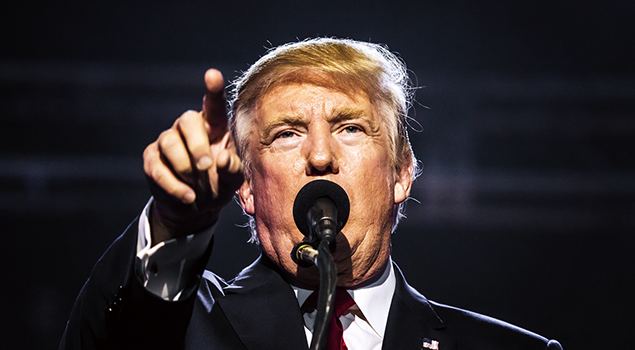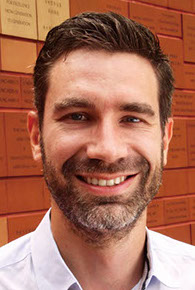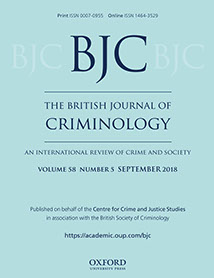
HOW DONALD TRUMP ESTABLISHES HIS
CHARISMA USING
OUTSIDERS AS
‘FOLK DEVILS’
Dr Paul Joosse has drawn on years of research into charismatic leaders of new religions and social movements to find striking similarities with the rise of the US president.
In 2015, Dr Paul Joosse arrived at HKU’s Department of Sociology from Canada and was considering how to apply his expertise on charismatic leaders in emerging religious and social movements, when Donald Trump announced he would run to be the Republican nominee for American president. Most people initially wrote Mr Trump off as a joke, but Dr Joosse saw some familiar and disturbing patterns.
Like charismatic leaders of social movements and religious cults, Mr Trump basks in courting controversy, stirring dissent, stoking fear and attacking the establishment.
“It’s a truism in the sociology of religion that if you have no tension with wider society, you will have no basis for appeal to followers. Many cult leaders court controversy because it gives people something that is different from what they’ve been hearing. Time and again, we heard from Trump supporters that he was saying things they weren’t hearing from any other candidate,” he said.
Yet even as he attacked the establishment, Trump sought and succeeded in creating a position for himself within it. This success led Dr Joosse to dig deeper and propose a theory that brings together two seemingly contradictory ideas.
One is ‘moral panic theory’, in which pillars of society seek to solidify their own moral authority in society by constructing or playing up ‘folk devils’. The other is the theory of charisma, in which leaders emerge by attacking traditional morality and establishing a new moral vision. Trump managed to do both.

![]() He realises that the basis for his
He realises that the basis for his
authority is a very emotional, primal connection that he has built up with a devoted base of followers, and anything
that comes in the way of that threatens to disconnect him from this base. But how do you operate an incredibly complicated political system on this basis? ![]()
Dr Paul Joosse
‘Extraordinariness’ of Trump
Trump simultaneously condemned contemporary ‘folk devils’ in American society, such as Muslims and immigrants, while putting forth the idea that the establishment leaders were not doing enough to protect society from them. Furthermore, Trump’s proposed solutions – like banning Muslims and building a border wall – were as much aimed at Republican leaders as Democratic ones, because he consistently criticised the Republican establishment as being ‘weak’ on issues that are traditionally important to its base.
“We of course need to pay attention to how Trump’s messaging is an attack on migrants, women and people of colour, but it’s also every bit as much an attack on the Republican establishment itself,” said Dr Joosse.
In fact, the Republicans were a necessary foil – what Dr Joosse dubs a ‘counter role’ to Trump as charismatic leader. Their reactions of shock and outrage legitimised Trump by confirming the notion that he is an extraordinary, special figure who only comes once in a lifetime.
“Very often we have seen how astonishment and condemnation create a sense of extraordinariness around Trump. In reality, he has merely parroted some of the unacceptable statements you might hear around the Thanksgiving table. But these statements became remarkable when he expressed them where no one else would – on the debate stage,” Dr Joosse said. “Trump has been called ‘Teflon Don’ because he can say and do things that would kill the political career of anyone else. Supporters see this as a miraculous ability, and so this adds to his appeal.”
Sustainability challenge
Dr Joosse’s theory on moral panic and charismatic leaders draws on work by sociologists such as Max Weber, who pointed out that charisma is unstable and liable to diminish over time. Trump seems to fight against this constraint by continuing to hold political rallies long after winning the presidency, and firing staff who try to rein him in.
“He realises that the basis for his authority is a very emotional, primal connection that he has built up with a devoted base of followers, and anything that comes in the way of that threatens to disconnect him from this base. But how do you operate an incredibly complicated political system on this basis? This is why charisma is often a flash in the pan. It accomplishes initial victories but isn’t sustainable over time unless it’s transformed into some other form of power.”
Dr Joosse is now going full circle, taking some of the ideas he developed while studying Trump to look again at political leaders that preceded Trump, but who were forerunners for his style. He is particularly interested in figures who were widely viewed as ‘entertaining’, such as Toronto’s crack-smoking former mayor Rob Ford. “Rob Ford and maybe [former wrestling star turned American governor] Jesse Ventura showed – before Trump ever did – what outlandish behaviour can do for you in a political system such as what we see in the US currently. It can help you.”
Dr Joosse’s work on charisma recently won the American Sociological Association’s 2018 Clifford Geertz Award for Best Article in the Sociology of Culture and has been published in high impact journals such as Social Forces, Sociological Theory, and The British Journal of Criminology, among others.
Dr Joosse’s ‘Expanding Moral Panic Theory to Include the Agency of Charismatic Entrepreneurs: The Case of Donald Trump’ was published in The British Journal of Criminology.

Next
Back
Home
November 2018
Volume 20
No. 1

